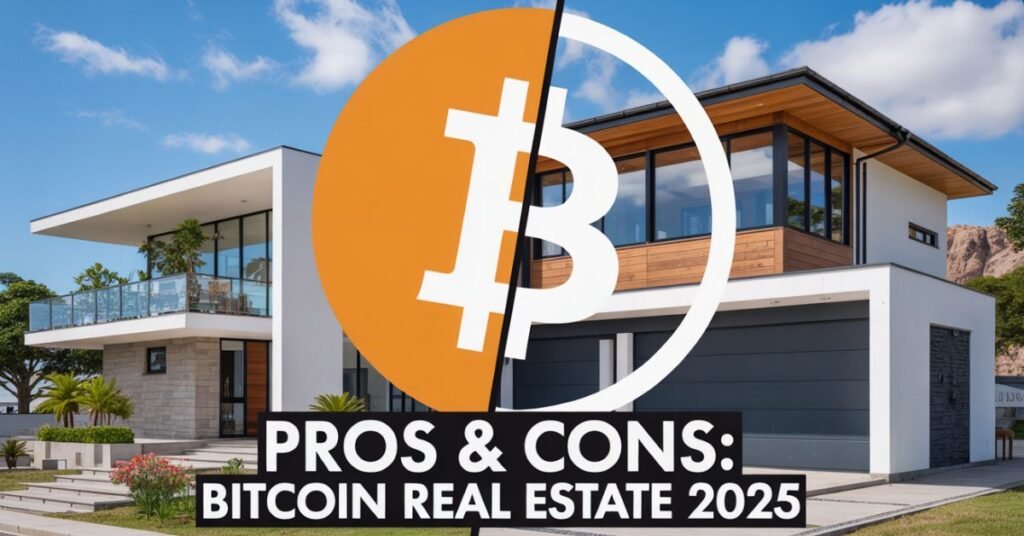
As cryptocurrency continues to weave its way into everyday finance, buying real estate with Bitcoin is no longer just a futuristic idea—it’s happening now. In 2025, with Bitcoin’s value stabilizing around $60,000 to $70,000 per coin and more platforms facilitating crypto transactions, this method is gaining traction, especially in the US where searches for “buy house with crypto” have spiked 140% year-over-year. But is it the right choice for you? This post breaks down the key pros and cons, drawing from current trends and expert insights, to help you decide if using Bitcoin for your next property purchase solves your financial puzzles or creates new ones. We’ll also touch on practical steps to get started safely.
Whether you’re a crypto enthusiast eyeing a dream home or an investor exploring innovative payment options, understanding these factors can prevent costly mistakes and maximize benefits. Let’s dive in.
The Rise of Bitcoin in Real Estate: Why 2025 Matters
Bitcoin’s integration into real estate isn’t new, but 2025 marks a pivotal year. Regulatory clarity from bodies like the SEC has made crypto transactions more mainstream, and platforms like Propy and RealOpen now handle Bitcoin-based deals seamlessly. In the US, states like Florida and California lead with crypto-friendly policies, allowing direct Bitcoin payments for properties. This trend aligns with broader market shifts, where high inflation and traditional banking fees push buyers toward alternatives. If you’re tired of wire transfer hassles or seeking borderless transactions, Bitcoin could be a game-changer—but it’s not without risks.
Pros of Using Bitcoin for Real Estate Purchases
Bitcoin offers unique advantages that traditional methods can’t match, especially for tech-savvy buyers. Here are the top benefits based on 2025 data and case studies.
-
Faster Transactions and Lower Fees: Unlike bank wires that can take days and cost 1-3% in fees, Bitcoin transactions often settle in hours with fees under 1%. This speed is a lifesaver for competitive markets, where quick closes can secure deals. For instance, a 2025 Miami condo sale using Bitcoin closed in under 48 hours, saving the buyer $5,000 in fees.
-
Global Accessibility and Borderless Payments: If you’re an international buyer, Bitcoin eliminates currency conversion headaches and restrictions. In 2025, with Bitcoin’s global liquidity, you can purchase US properties from anywhere without forex fees, appealing to the 15% rise in cross-border real estate investments. This solves problems for expats or remote workers who face banking barriers.
-
Potential for Appreciation: Paying with Bitcoin means you’re essentially “cashing out” at the current value, but if Bitcoin’s price rises post-purchase (as it did 20% in Q1 2025), you could benefit indirectly through portfolio growth. Investors use this to hedge against inflation, turning real estate into a dual-asset play.
-
Enhanced Privacy and Security: Blockchain technology provides transparent yet pseudonymous transactions, reducing fraud risks compared to traditional methods. In 2025, with rising cyber threats, this feature protects sensitive financial data during high-stakes deals.
-
Innovative Financing Options: Some platforms offer Bitcoin-backed loans or escrow services, allowing you to leverage your crypto without selling it outright. This is ideal if you want to hold Bitcoin long-term while acquiring property, solving liquidity issues for holders.
These pros make Bitcoin particularly attractive for high-net-worth individuals or those in volatile economies, where traditional banking falls short.
Cons of Using Bitcoin for Real Estate Purchases
Despite the hype, Bitcoin’s volatility and regulatory hurdles can turn a smooth purchase into a nightmare. Here’s a candid look at the downsides to help you weigh the risks.
-
Price Volatility Risks: Bitcoin’s value can swing wildly—dropping 10% in a day isn’t uncommon, as seen in early 2025 fluctuations. If you agree to a price in Bitcoin but its value crashes before closing, you might need to pony up more coins or renegotiate, potentially derailing the deal.
-
Regulatory and Legal Uncertainties: While progress has been made, not all US states fully recognize crypto for real estate, leading to tax complications or invalid contracts. For example, capital gains taxes on Bitcoin sales could add 20-37% to your costs, depending on your bracket. This creates headaches for buyers unfamiliar with IRS guidelines.
-
Limited Acceptance and Infrastructure: Only a fraction of sellers and agents accept Bitcoin—about 5% of US listings in 2025. You might face resistance or need third-party converters, adding layers of complexity and potential scams. Plus, if the seller isn’t crypto-savvy, educating them could slow things down.
-
Security and Fraud Concerns: Hacking risks are real; a compromised wallet could wipe out your payment. In 2025, crypto scams cost users $2.5 billion, with real estate fraud on the rise. Without FDIC-like protections, recovering lost funds is tough, making this a poor fit for risk-averse buyers.
-
Opportunity Costs and Liquidity Issues: Tying up Bitcoin in a purchase means missing out on other investments if crypto surges. Converting back to fiat for closing costs can also incur extra fees, reducing overall efficiency.
These cons highlight why Bitcoin suits experienced users but might overwhelm first-timers.
How to Navigate Bitcoin Real Estate Purchases: A Problem-Solving Guide
If the pros outweigh the cons for you, here’s a step-by-step plan to proceed safely in 2025:
-
Research Regulations: Check state laws and consult a crypto-tax expert to understand implications. Use tools like the IRS crypto tax guide for compliance.
-
Choose Reliable Platforms: Opt for established services like Propy or BitPay, which handle escrow and conversions securely.
-
Secure Your Wallet: Use hardware wallets and enable multi-factor authentication to minimize hacks.
-
Lock in Prices: Agree on a USD equivalent at signing to hedge against volatility, or use stablecoins for stability.
-
Get Professional Help: Work with real estate attorneys specializing in crypto to review contracts and avoid pitfalls.
By following these steps, you can mitigate many cons and turn Bitcoin into a powerful tool for your purchase.
Final Thoughts: Is Bitcoin Right for Your 2025 Real Estate Deal?
Weighing the pros—like speed, accessibility, and innovation—against the cons—such as volatility and regulations—Bitcoin for real estate in 2025 is best for those with high risk tolerance and crypto experience. It solves problems for global buyers seeking efficiency but could complicate things for traditionalists. If you’re intrigued, start small with research or a consultation to test the waters. As the market evolves, this could become the norm, but for now, proceed with caution to ensure it aligns with your goals.


